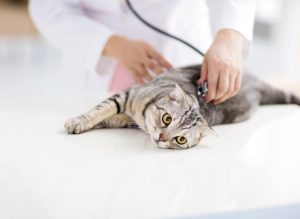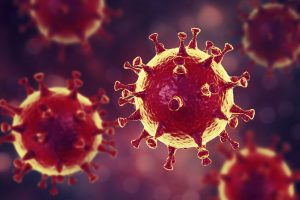COVID-19 Information for Pet Owners and Veterinary Staff
 LAST UPDATED: May 4, 2020
LAST UPDATED: May 4, 2020
Two Cats Test Positive for COVID-19
Two cases of SARS-CoV-2, the virus that causes COVID-19, have been confirmed in pet cats by the CDC, United States Department of Agriculture (USDA), and National Veterinary Services Laboratories (NVSL). These are the first pets in the U.S. to test positive for the virus. Learn more specifics about these findings here.
Both cases were confirmed in New York in two cats from separate households that were exhibiting mild respiratory symptoms. A veterinarian tested the first cat, though no members in the household were confirmed to be ill with COVID-19. It’s possible that the virus was transmitted by someone who was asymptomatic, or even by an infected person outside the home. The second cat tested positive belongs to an owner who had tested positive prior to the cat showing symptoms.
What This Means for Pet Owners
Public Health officials are still learning about this new virus, but as of now, there is still no evidence that pets play a part in the spread of COVID-19. Until we are able to study and find out more, the CDC recommends the following things for pet owners:
- Refrain from letting your pets interact with people or other animals from outside the household
- Keep cats indoors as much as possible to prevent them from interacting with other animals or people
- Keep dogs on leashes when on walks, maintaining at least a 6-foot buffer from people and other animals
- Avoid dog parks and public places where groups of people and/or dogs gather
The American Veterinary Medical Association, shares some helpful information for pet owners regarding COVID-19.
“If you are not ill with COVID-19, you can interact with your pet as you normally would, including walking, feeding, and playing. You should continue to practice good hygiene during those interactions (e.g., wash hands before and after interacting with your pet; ensure your pet is kept well-groomed; regularly clean your pet’s food and water bowls, bedding material, and toys). Out of an abundance of caution, it is recommended that those ill with COVID-19 limit contact with animals until more information is known about the virus. Have another member of your household take care of walking, feeding, and playing with your pet. If you have a service animal or you must care for your pet, then wear a facemask; don’t share food, kiss, or hug them; and wash your hands before and after any contact with them.”
If You Have COVID-19
There is still so much we don’t know about this virus, but it certainly spreads from person-to-person, and it appears that it can also spread from people to animals, according to the CDC. The first case of an animal testing positive for the virus that causes COVID-19 was with a tiger at a New York City zoo that was exhibiting respiratory symptoms. Public health official believe the large cat became ill after exposure to a zoo employee who was infected with the virus. This investigation is ongoing, and the CDC is working with human and animal health partners in order to keep tabs on the situation. More study is necessary to better understand if and how different animals could be affected by COVID-19.
Spread from Human to Pet
The CDC is aware of a small number of cases of COVID-19 in pets across the globe, including cats and dogs– mostly contracted after close contact with humans who tested positive. Though information is limited, it is believed that the risk of animals spreading the virus is low, while COVID-19 can spread from people to animals in some situations. The CDC recommends treating pets as you would other human family members– if a person within the household becomes ill, isolate that person from everyone else, pets included, to prevent the virus from spreading.
 No Evidence that Animals Spread the Virus
No Evidence that Animals Spread the Virus
At this time, the U.S. Centers for Disease Control and Prevention (CDC) and the World Health Organization (WHO) say there is no evidence that companion animals, including pets, can spread COVID-19. However, as with any disease, it’s always a good idea to wash your hands after being around animals.
“While there has been one instance of a dog being infected in Hong Kong, to date, there is no evidence that a dog, cat or any pet can transmit COVID-19. COVID-19 is mainly spread through droplets produced when an infected person coughs, sneezes, or speaks. To protect yourself, clean your hands frequently and thoroughly.” – World Health Organization
According to the CDC, people who are sick with COVID-19 should restrict contact with pets and other animals, just like you would restrict your contact with other people. When possible, a member of the household other than the individual who is ill should care for any animals in the household. Those infected with COVID-19 should avoid contact with animals, including petting, snuggling, being kissed or licked, and sharing food. Those who must care for a pet, or who will be around animals while sick, should wear an appropriate face mask, and wash hands thoroughly before and after interacting with those animals.
WHO and CDC continue to monitor the latest research on this and other COVID-19-related topics, and will update as new findings are available.
